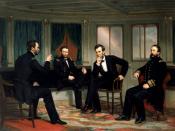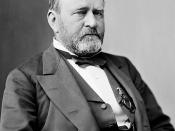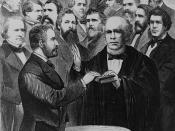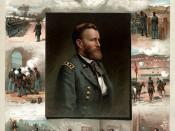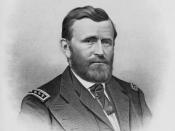The American Experience: Ulysses Simpson Grant In the PBS documentary series "The American Experience", Ulysses S. Grant's life is profiled in what can be considered the most tumultuous period in U.S. history. The documentary takes four hours and two episodes to cover Grant from his boyhood to the end of the Civil War and through many battles as one of the U.S. Army's most celebrated military officers. It also explores Grant's road to the White House, as our 18th President of the United States and through the trials and traumas of his life.
As depicted in the PBS documentary, which aired on the Alabama Public Television network, Grant was a quite man. He was a devoted husband and father. Grant also had a passion for horses and called his farm Hardscrabble because life on the ranch was some of the toughest times he had ever encountered as a youngster. Grant's father sent him to the United States Military Academy at West Point at the age of 16, but he was considered a failure.
As the War Between the States broke out, Grant was called back to the Army and ironically it was the Army that later took him to the White House. He was not very fond of politics, public life or making speeches. In fact, one of his closest friends, William Tecumseh Sherman advised Grant that Washington would destroy him. The documentary shows how it nearly did.
Grant campaigned for President using the slogan "Let Us Have Peace". However, peace was very hard to come by. He took over a post-war country plagued by racial problems, reconstruction and economic shortfalls, at the same time facing an industrial society and territorial expansion. Grant fought very hard for racial equality and was concerned about native American Indians, a difficult problem made worse by General George Armstrong Custer at the Battle of the Little Big Horn. Grant also experienced some harsh times in the White House as several scandals surfaced throughout his presidency. No doubt, Grant was a controversial President and probably looked forward to leaving public office since he always dreaded it in the first place.
When Grant's term of office ended, he and his wife were essentially "homeless waifs" until a lucky silver mine strike bought them enough money to travel abroad for two-years. As noted in the documentary, crowds, a czar and a queen all proclaimed Grant as a conquering hero. Upon his return to the United States, his son's friend encouraged him to invest in Wall Street, which is considered his worst financial blunder. Broke and suffering ill health from throat cancer, Grant was determined to make money by writing his Memoirs, and wrote a surprisingly well-written book about his life and times as our President. As shown in his book and later discussed in this documentary, history has not been very kind to Grant. Interestingly, Grant's men revered him and President Lincoln considered him to have the necessary leadership attributes to be America's first Lieutenant General since George Washington. Many others detested Grant. The famed photographer Matthew Brady dramatically portrayed his victories in the Civil War in the documentary with many vintage pictures shown throughout the film.
In conclusion, The American Experience: Ulysses S. Grant is an extremely well-done documentary about the life and times of our 18th U.S. President. The film does not gloss over Grant's shortfalls or glorify his successes. It gives the man credit as a President who tried very hard to do things correctly, even when things turned out to be wrong. Throughout the overall process, the documentary paints a very fascinating portrait for one of the most intriguing American warriors and Presidents in U.S. history.
Source The American Experience: Ulysses S. Grant. A Public Broadcasting System (PBS) documentary, taped for our home video collection. Also, can be ordered by visiting www.shoppbs.com
